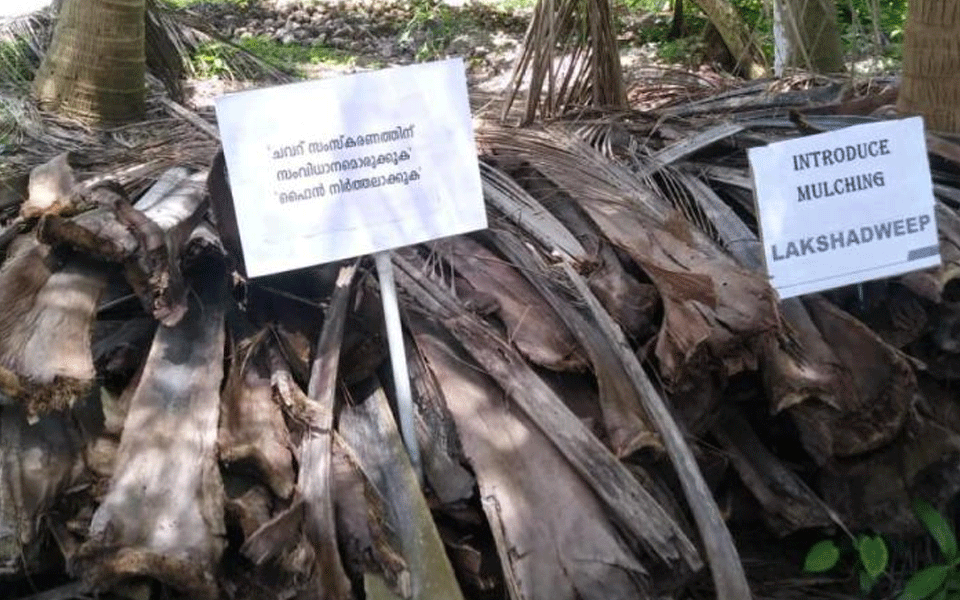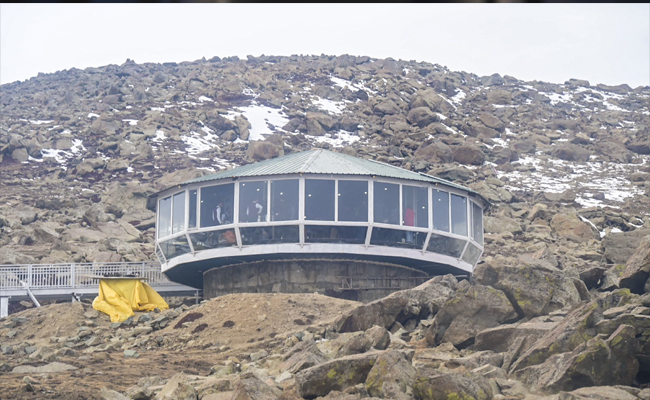Kochi: Residents of Lakshadweep on Monday staged "coconut leaves and palm" protest across inhabited islands against the administration's order to levy a fine if coconut palm leaves, shells or trunks were found in and around their dwelling places.
Holding placards which read "introduce mulching" and "stop imposing fine", the islanders, under the banner of Save Lakshadweep Forum (SLF), stood in front of a pile of coconut leaves in the properties urging the administration to withdraw the "anti-people" order.
In their one-hour long protest, the islanders urged the administration to withdraw the decision to impose fine on them and introduce technology to convert the organic materials from the coconuts as compost --a mixture of ingredients used to fertilize and improve the soil.
"Our demand is that the fine imposed on the people should be withdrawn and a proper waste management system should be implemented. Unless the waste management system is implemented there is no genuine right from the side of administration to collect fine on falling of coconut leaves and other palms in their property," Lakshadweep MP Mohammed Faizal P P told P T I.
"Where do the people of islands are expected to do the scientific processing of leaves and palms," he asked.
The Lok Sabha member said an islander cannot afford to have his own scientific processing unit or incinerator and it is the prime duty of the Lakshadweep administration to provide such a facility.
"If such facilities are made available and people are not obeying this, then you can impose the fine. The primary responsibility of the administration should be to ensure the installation of the scientific processing units like incinerators in the island," Faizal said.
In the order issued on June 4 on management of cleanliness and hygiene in the islands in the wake of COVID-19 pandemic, the administration has said each family of individuals who stay in any premise shall maintain cleanliness with certain standards and hygiene in and around their respective places at all times.
It said tender coconut shells, tree leaves, coconut husks, trunks etc in and around dwelling places/public places must be disposed off scientifically by the landowners without affecting hygiene to the environment.
"No persons is allowed to throw or break or spread coconuts, fruits leftovers, vegetables waste on roads, footpaths, public areas, lagoon, sea and the beaches", it said, prohibiting the disposal by burning of any type of solid waste at roadsides, beaches and in open places.
It said whoever violates or contravenes any of the aforesaid directions shall be liable for punishment with fine as per Schedule 1 of the Lakshadweep Solid Waste Management Bye-Law, 2018 and also be liable to criminal proceedings for offence punishable Under Section 188 IPC (Disobedience to order duly promulgated by public servant).
Lakshadweep has been witnessing a series of protests by residents for the past few weeks against Administrator Praful Khoda Patel's decision to implement reform measures in the islands.
The Save Lakshadweep Forum (SLF), a platform of protesters, has alleged that the measures were being implemented without taking people of islands into confidence.
Accusing the administration of going ahead with the "anti-people reform measures" in the islands, the SLF has said they would continue their protest till the administration withdraws such measures in the archipelago.
Let the Truth be known. If you read VB and like VB, please be a VB Supporter and Help us deliver the Truth to one and all.
Bhatkal: Speaker of the Karnataka Legislative Assembly U. T. Khader visited Bhatkal in Uttara Kannada district on Saturday and attended a local cricket match being played as part of a tournament organised by the Cosmos Sports Centre of Bhatkal.
After attending a programme at Anjuman Hami-E-Muslimeen, Khader proceeded to the Bhatkal Taluka Stadium, where the tournament is underway. He was accompanied by office-bearers of the Cosmos Sports Centre and several local community leaders.
Those present during the visit included President of Majlis-e-Islah Wa Tanzeem and former JD(S) leader Inayathullah Shabandri, Vice President of Tanzeem Atiqur Rahman Muniri, General Secretary Abdul Raqeeb MJ, President of Cosmos Sports Centre Ismail Anjum, Managing Director of Mohtisham Complexes S. M. Arshad, former president of the Bhatkal Muslim Youth Federation Imtiyaz Udyawar, among others.
Addressing players and organisers, Khader extended his best wishes to the participating teams and urged the players to uphold the spirit of sportsmanship. He said such tournaments help promote unity and brotherhood among the youth.
The cricket tournament began on November 21 and will conclude with the final match on December 21. It is being organised as part of the golden jubilee celebrations of the Cosmos Sports Centre.
Cosmos Sports Centre is one of the member clubs of the Bhatkal Muslim Youth Federation and is known for its active role in promoting sports in the town. Apart from sporting activities, the centre is also involved in various social and community initiatives, including efforts to promote education among students.






